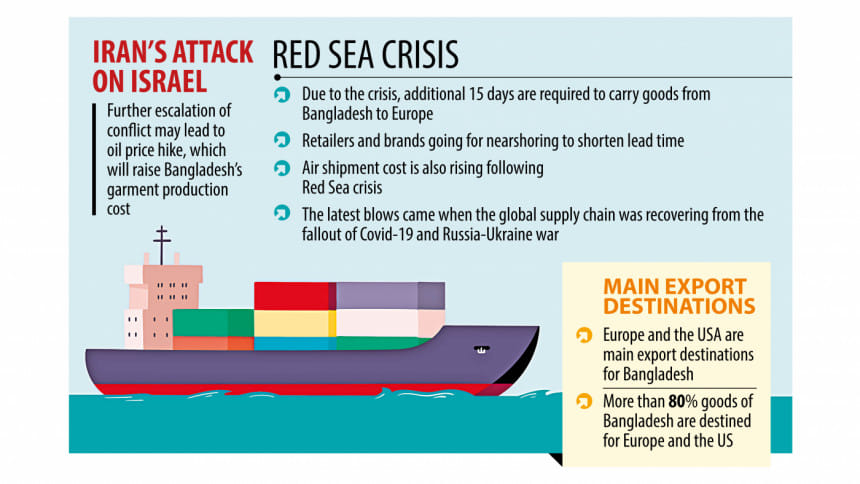Garment exports face fresh trouble as Iran-Israel conflict stokes fears

Garment shipments from Bangladesh are witnessing fresh concerns after tension escalated between Iran and Israel, piling up pressure on the global supply chain already creaking owing to the ongoing Red Sea crisis and the Gaza war.
Local apparel exporters fear that the cost of doing business will increase further since global petroleum prices might jump if the tension escalates into a full-blown war, which will raise the shipping costs and affect oil traffic going through the Middle East.
The latest concerns come after Iran carried out direct drone and missile attacks on Israel on Sunday in retaliation for an Israeli strike on the Islamic Republic's consulate in Syria's Damascus.
Buyers are already asking suppliers to execute orders as soon as possible because the time to transport goods has been extended by an additional 15 days following the outbreak of the Red Sea crisis in October.
Before the crisis involving the Red Sea, which connects Asia to Europe via the Suez Canal, emerged as the heart of global tension, 30 days were usually needed to ship goods from Chattogram to ports in Europe.
The tension has forced carriers to reroute ships around the Cape of Good Hope in South Africa, resulting in delays of up to three weeks since they would have to travel an additional 3,500 kilometres, raising operational expenses.
Also, because of the crisis, a number of clothing retailers and brands are near-shoring and shifting some orders away from Bangladesh to Turkey or Vietnam in order to avoid disruptions to the supply chain.
The loss of orders comes at a time when the biggest foreign currency-earning sector of Bangladesh is eyeing recovery from the chaos caused to the global supply chain by the severe fallout of the Covid-19 pandemic and the Russia-Ukraine war.
"Near-shoring is happening in some cases. Many buyers are placing orders with Turkey whereas these orders were supposed to come to Bangladesh," said Asif Ashraf, managing director of Urmi Garments Ltd, an apparel exporter.
"This is because securing deliveries on time is vital to buyers."
Near-shoring takes place when companies outsource to a nearby country.
In the global garment trade, a shorter lead time has emerged as a key feature for countries looking to become more competitive since many players compete in the same markets.
Industry people say if costs climb for international retailers and brands, they tend to decrease the price of goods sourced from supplying nations like Bangladesh, which ultimately hit the pockets of exporters.
"For instance, buyers are managing additional freight costs caused by the Red Sea crisis by paying lower prices to suppliers," said Md Nasir Uddin, vice-president of the Bangladesh Garment Manufacturers and Exporters Association (BGMEA).
Although international companies bear the shipping costs, they absorb the extra expenditures by passing the cost on to suppliers directly or indirectly, exporters said.
In more than 95 percent of cases, buyers pay the freight charge as they do trade on the freight on board method. Suppliers bear the burden in less than 5 percent of shipments when the trade is carried out under the freight on cost method.
Whatever the case, buyers pass on any additional costs to suppliers, according to both Ashraf and Nasir.
The entrepreneurs warn if the Iran-Israel conflict escalates, it will affect the garment trade of Bangladesh.
The shock may come in the form of an elevated shipping cost since the price of petroleum products may go up, which will raise the cost of production and the transport cost.
The protracted Middle East crisis means the efforts to expand the garment sector's footprint in emerging markets such as Saudi Arabia, Kuwait, Iraq, and Iran will not be as smooth as many exporters expected.
Former BGMEA President Md Siddiqur Rahman said in the case of air shipments to carry goods from Dhaka to Europe, the cost has already gone up after the beginning of the Red Sea crisis.
"The Iran-Israel conflict may increase the rate further."
Currently, airlines charge more than $2.50 to carry one kilogramme of goods from Dhaka to airports in Europe, way up from 30 US cents levied on the same destinations if products are transported using the sea routes.


 For all latest news, follow The Daily Star's Google News channel.
For all latest news, follow The Daily Star's Google News channel. 










Comments